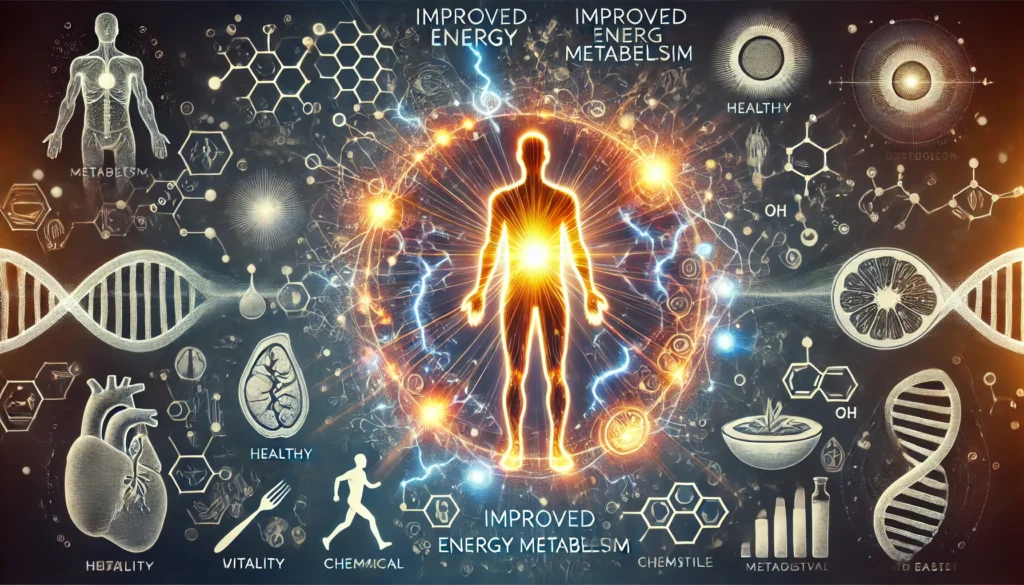Ornithine Ketoglutarate (OKG) is a combination of two compounds, ornithine and alpha-ketoglutarate, that has gained attention for its potential benefits in supporting metabolic health, muscle function, and recovery. OKG is primarily studied in the context of athletic performance and recovery, but its nootropic potential has also been explored due to its impact on neurotransmitter production and cognitive functions. This article provides a comprehensive analysis of OKG, examining its sources, chemistry, physiological mechanisms, nootropic benefits, dosage guidelines, side effects, drug interactions, and other important considerations for its safe use as a supplement.
You May Also Like:
Citicoline: Benefits, Dosage, Side Effects, Drug Interactions, And Other Important Information
Ornithine Ketoglutarate: Potential Nootropic Benefits, Dosage, Side Effects, Interactions, and Other Important Information About This Supplement is an original (NootropicsPlanet) article.
Sources of Ornithine Ketoglutarate
Ornithine Ketoglutarate is not typically found in significant amounts in food sources, as it is a synthesized compound that is created through the combination of two naturally occurring substances—ornithine and alpha-ketoglutarate.
- Ornithine: Ornithine is a non-proteinogenic amino acid that plays a critical role in the urea cycle, which is responsible for detoxifying ammonia in the body. It is found in foods rich in protein, such as meat, fish, eggs, and dairy.
- Alpha-Ketoglutarate: Alpha-ketoglutarate is a key intermediate in the Krebs cycle, a critical energy-producing pathway in cells. It is involved in amino acid metabolism and is naturally produced in the body, with dietary sources including meat, dairy, and certain plant-based foods like spinach.
Ornithine Ketoglutarate is typically obtained through supplementation, as it is often combined in specific ratios to achieve its potential health benefits.
Ornithine promotes mental clarity and reduces brain fog—Enhance Your Focus, Shop Now on Amazon!

Chemistry of Ornithine Ketoglutarate
Ornithine Ketoglutarate is composed of two distinct compounds: ornithine, a non-essential amino acid, and alpha-ketoglutarate, a critical intermediary in cellular energy metabolism. The two components of OKG work synergistically to support energy production and nitrogen metabolism in the body.
- Ornithine: Ornithine’s primary function is within the urea cycle, where it helps convert ammonia (a toxic byproduct of protein metabolism) into urea, which is then excreted from the body through urine. Ornithine also serves as a precursor for the synthesis of other amino acids, such as arginine, which is involved in nitric oxide production, a molecule that helps dilate blood vessels and improve blood flow.
- Alpha-Ketoglutarate: Alpha-ketoglutarate is a critical component of the Krebs cycle (also known as the citric acid cycle), a series of chemical reactions used by cells to generate ATP (adenosine triphosphate), the primary energy currency of the body. It also plays a role in the metabolism of amino acids, particularly glutamate, which is an important neurotransmitter in the brain.
When combined, these two compounds in Ornithine Ketoglutarate help optimize nitrogen balance, energy production, and cognitive functions, making it a potential candidate for nootropic use.
Physiological Mechanisms of Ornithine Ketoglutarate
The physiological effects of Ornithine Ketoglutarate are rooted in its ability to regulate energy metabolism and support amino acid synthesis. Below are some of the key mechanisms through which OKG exerts its effects on the body and brain:
- Nitrogen Metabolism: Ornithine plays a crucial role in the urea cycle, helping to detoxify ammonia, which is a byproduct of protein metabolism. By enhancing nitrogen metabolism, OKG may improve overall metabolic efficiency and reduce the buildup of harmful compounds in the body.
- Energy Production: Alpha-ketoglutarate supports the Krebs cycle, facilitating the production of ATP in the mitochondria of cells. This process is critical for providing energy to tissues, including the brain, which requires a significant amount of ATP for optimal cognitive function.
- Neurotransmitter Support: Both ornithine and alpha-ketoglutarate play roles in amino acid metabolism, influencing the production of neurotransmitters like glutamate and gamma-aminobutyric acid (GABA). Glutamate is the primary excitatory neurotransmitter in the brain, while GABA is the main inhibitory neurotransmitter. The balance between these neurotransmitters is crucial for cognitive functions such as memory, learning, and mood regulation.
- Stress Response and Recovery: Research has suggested that OKG supplementation may help reduce the negative effects of stress on the body, particularly in the context of exercise. By enhancing nitrogen balance and energy production, OKG may aid in muscle recovery, improve endurance, and reduce fatigue, indirectly supporting cognitive function during periods of physical or mental exertion.

Nootropic Benefits of Ornithine Ketoglutarate
While Ornithine Ketoglutarate has primarily been studied for its effects on physical performance, there is emerging interest in its potential nootropic benefits. Below are some of the possible cognitive enhancements that may result from supplementing with OKG:
- Improved Cognitive Performance: Due to its role in energy production and neurotransmitter regulation, OKG may enhance cognitive performance, particularly under conditions of mental fatigue. The increased availability of ATP in brain cells may help support focus, attention, and overall mental clarity.
- Stress Reduction and Mood Enhancement: OKG’s effects on neurotransmitter balance, particularly the modulation of glutamate and GABA levels, may help alleviate stress and improve mood. The ability to manage stress more effectively is critical for maintaining cognitive performance in both short-term and long-term contexts.
- Memory Support: The metabolic effects of OKG, including the support for energy production and amino acid metabolism, could potentially benefit memory. Neurotransmitter balance, particularly involving glutamate, is important for synaptic plasticity, the process through which memories are formed and retained in the brain.
- Enhanced Sleep Quality: By reducing stress and improving overall metabolic function, OKG may contribute to better sleep. Sleep is essential for cognitive health, particularly for memory consolidation and overall brain repair. OKG’s influence on neurotransmitter balance could support more restful and restorative sleep patterns.

Dosage and Supplementation Guidelines
There is currently no official recommended dosage for Ornithine Ketoglutarate specifically as a nootropic supplement. However, typical dosages used in research for performance enhancement and recovery range from 3 to 6 grams per day. The dosage can vary depending on individual factors such as body weight, age, and specific health goals.
- General Dosage: For general health and cognitive support, a typical dose of OKG is between 3 to 5 grams per day. It is recommended to split this dosage into two or more servings to maintain steady levels in the bloodstream.
- Performance and Recovery: For those looking to enhance physical performance or recovery, OKG is typically taken in doses of 5 to 6 grams per day, particularly when recovery from intense physical or mental exertion is a goal.
OKG is typically taken as a powder mixed with water, but it is also available in capsule form. It is essential to follow the manufacturer’s dosage recommendations and consult with a healthcare provider before starting any supplementation regimen.
Side Effects and Safety
Ornithine Ketoglutarate is generally considered safe when taken at recommended dosages. However, there are a few potential side effects and considerations:
- Gastrointestinal Distress: Some individuals may experience mild gastrointestinal discomfort, such as bloating, gas, or diarrhea, particularly when taking higher doses of OKG.
- Ammonia Toxicity: While ornithine helps detoxify ammonia in the body, excessive levels of ammonia (often from other metabolic issues or high-protein diets) may still cause discomfort or adverse effects in some individuals. It’s important to monitor any signs of ammonia toxicity, such as confusion or lethargy.
- Potential Drug Interactions: As OKG could influence energy production and neurotransmitter synthesis, it may interact with certain medications, particularly those affecting the central nervous system (e.g., antidepressants or anti-anxiety medications). Always consult a healthcare provider before starting supplementation if you are taking prescription medications.
- Kidney and Liver Health: Individuals with pre-existing kidney or liver conditions should exercise caution when using OKG supplements. As with any compound that influences metabolic processes, individuals with compromised kidney or liver function should consult with a healthcare provider prior to supplementation.
Ornithine promotes mental clarity and reduces brain fog—Enhance Your Focus, Shop Now on Amazon!

Interactions with Other Supplements and Medications
Ornithine Ketoglutarate may interact with other supplements, particularly those that influence energy metabolism or neurotransmitter function. Below are some common interactions to be aware of:
- Other Amino Acids and Proteins: Since OKG influences amino acid metabolism, taking it in combination with other amino acids or high-protein supplements may alter its effects or enhance its benefits. Individuals should monitor their intake to avoid excessive nitrogen or ammonia buildup.
- Nootropic Stimulants: OKG’s influence on neurotransmitter balance may complement or interact with other nootropic supplements like caffeine or racetams. While it may enhance cognitive performance when used in combination, excessive stimulation from multiple sources could lead to overstimulation or anxiety.
- Medications Affecting Nitrogen Balance: Since OKG supports nitrogen metabolism, it may interact with medications that impact nitrogen balance or ammonia levels in the body. These include certain diuretics or medications used in the treatment of liver disease.
Should You Consider Ornithine Ketoglutarate as a Nootropic?
Ornithine Ketoglutarate shows promise as a nootropic supplement, particularly for individuals seeking cognitive enhancement, stress reduction, and improved energy metabolism. Its ability to support neurotransmitter balance and boost ATP production may offer a variety of cognitive benefits, including improved focus, memory, and mood regulation. As with any supplement, it is important to consider the potential side effects, dosage guidelines, and interactions with other substances. Consulting with a healthcare provider is recommended, especially for those with underlying health conditions or who are taking other medications. Ornithine Ketoglutarate is a promising supplement for cognitive performance, but more research is needed to fully understand its long-term effects and optimal usage for nootropic purposes.

References:
- Ornithine-alpha-ketoglutarate (OKG) supplementation is more effective than its component salts in traumatized rats. Retrieved from: https://pubmed.ncbi.nlm.nih.gov/8814202/
- Action of ornithine alpha-ketoglutarate, ornithine hydrochloride, and calcium alpha-ketoglutarate on plasma amino acid and hormonal patterns in healthy subjects. Retrieved from: https://pubmed.ncbi.nlm.nih.gov/2407764/
- The Effect Of Ornithine Alpha-Ketoglutarate (Okg) On Healthy, Weight Trained Men. Retrieved from: https://openurl.ebsco.com/EPDB%3Agcd%3A14%3A18737822/detailv2?sid=ebsco%3Aplink%3Ascholar&id=ebsco%3Agcd%3A21551607&crl=c&link_origin=scholar.google.com
- Use of ornithine alpha-ketoglutarate in clinical nutrition of elderly patients. Retrieved from: https://www.proquest.com/openview/f8e471c749c7ee8149d882624d25d3ff/1?pq-origsite=gscholar&cbl=105601
Important Note: The information contained in this article is for general informational purposes only, and should not be construed as health or medical advice, nor is it intended to diagnose, prevent, treat, or cure any disease or health condition. Before embarking on any diet, fitness regimen, or program of nutritional supplementation, it is advisable to consult your healthcare professional in order to determine its safety and probable efficacy in terms of your individual state of health.
Regarding Nutritional Supplements Or Other Non-Prescription Health Products: If any nutritional supplements or other non-prescription health products are mentioned in the foregoing article, any claims or statements made about them have not been evaluated by the U.S. Food and Drug Administration, and such nutritional supplements or other health products are not intended to diagnose, treat, cure, or prevent any disease.


